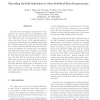Free Online Productivity Tools
i2Speak
i2Symbol
i2OCR
iTex2Img
iWeb2Print
iWeb2Shot
i2Type
iPdf2Split
iPdf2Merge
i2Bopomofo
i2Arabic
i2Style
i2Image
i2PDF
iLatex2Rtf
Sci2ools
92
Voted
RTAS
2008
IEEE
2008
IEEE
Throttling On-Disk Schedulers to Meet Soft-Real-Time Requirements
To achieve better throughput, many hard drive manufacturers use internal queues and scheduling to take advantage of vendor-specific characteristics and knowledge. While this trend seems promising, the control of service time from the view of the operating system is weakened, posing challenges for scheduling requests that have real-time requirements. Also, the diversity of disk drives makes extracting detailed timing characteristics and its generalization for all hard drives very difficult. This paper demonstrates three techniques we developed under Linux to bound real-time request response times for disks with internal queues and schedulers. One is to use the disk’s built-in starvation prevention scheme. The second is to prevent requests from being sent to the disk when real-time requests are waiting to be served. The third, limits the length of the on-disk queue in addition to the second technique. Our results show the ability to guarantee a wide range of desired response times wh...
| Added | 01 Jun 2010 |
| Updated | 01 Jun 2010 |
| Type | Conference |
| Year | 2008 |
| Where | RTAS |
| Authors | Mark J. Stanovich, Theodore P. Baker, An-I Andy Wang |
Comments (0)

